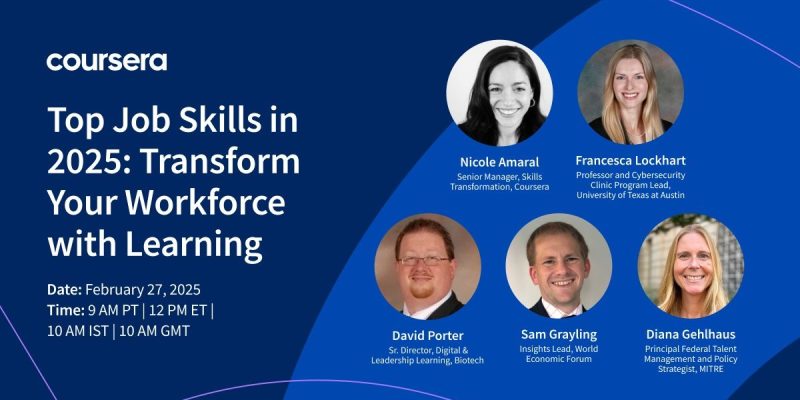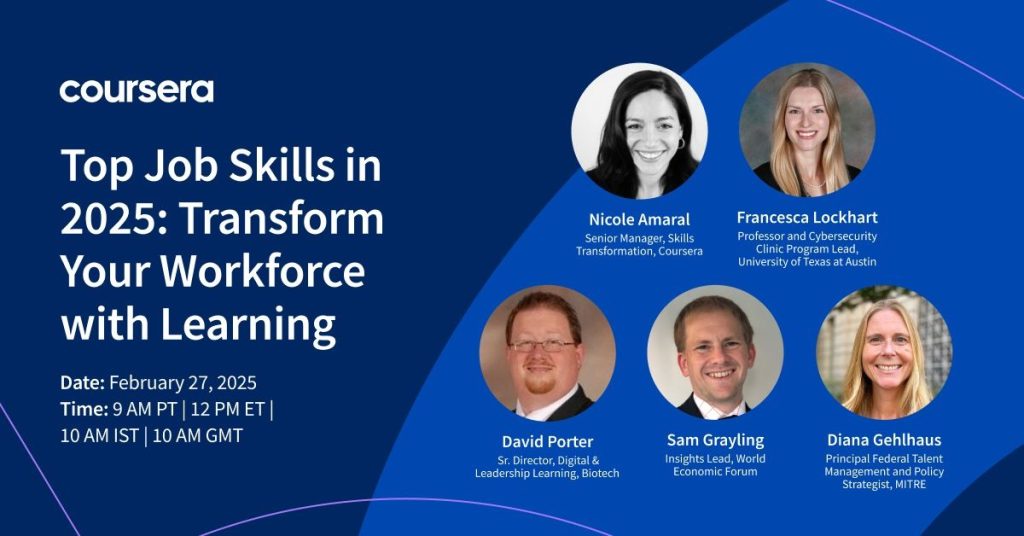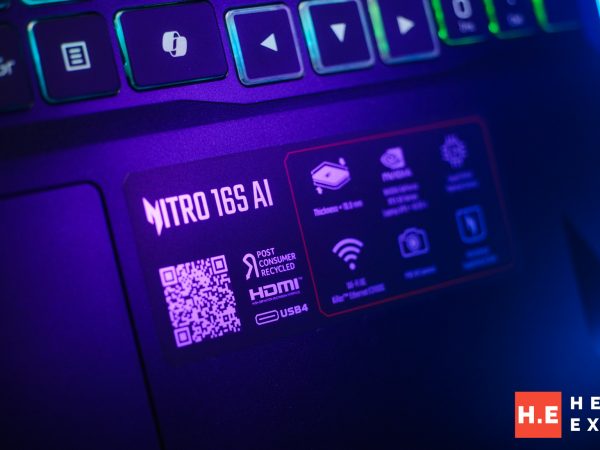
Coursera Panel Highlights Top Job Skills for 2025: AI, Cybersecurity, and Adaptability Lead the Way
TL;DR:
- A Coursera panel of experts discusses the crucial job skills for 2025, emphasizing the impact of generative AI.
- Cybersecurity skills are highlighted as increasingly vital across various industries due to evolving cyber threats.
- The panel stresses the importance of innovative, skills-based learning approaches and public-private collaborations.
- Cultivating a culture of lifelong learning and focusing on the “why” behind skills acquisition are deemed essential for career success.

A recent panel discussion hosted by Coursera brought together leading experts from diverse sectors to delve into the top job skills required for success in 2025. The panel, featuring insights from the World Economic Forum, MITRE, Moderna, and the University of Texas at Austin, explored the transformative impact of generative AI, the burgeoning demand for cybersecurity expertise, and innovative strategies for equipping individuals and organizations with the necessary competencies to thrive in a rapidly evolving professional landscape.
Generative AI: A Disruptive Force Requiring Reskilling
The panel unanimously acknowledged the profound impact of generative AI on organizations and job roles. Sam Grayling from the World Economic Forum highlighted that a significant majority of employers anticipate AI to substantially reshape their businesses by 2030. Nicole Amaral from Coursera pointed out that the rise of generative AI could impact the tasks of educators threefold, necessitating widespread reskilling initiatives across numerous professions to adapt to this technological wave. Diana GHouse of MITRE emphasized the rapid advancement of generative AI’s capabilities, requiring the public sector to modernize its IT policies to effectively leverage this technology. David Porter from Moderna shared his experience in introducing generative AI training, noting that it’s crucial to demonstrate the value and relevance of AI to employees, positioning it as a trusted assistant rather than an insurmountable challenge.
The Growing Imperative of Cybersecurity Skills
Another key trend underscored by the panel is the escalating demand for cybersecurity skills. Francesca Lockhart from the University of Texas at Austin explained that the swift evolution of cyberattacks, partly fueled by AI, intensifies the need for skilled cybersecurity professionals. She stressed that AI security is fundamentally cybersecurity, and individuals can apply their existing skills to secure AI systems. Sam Grayling noted that industries such as financial services, energy, technology, healthcare, and automotive/aerospace are experiencing particularly high demand for cybersecurity expertise due to their critical infrastructure and vulnerability to cyber threats. The panelists concurred that a heightened public awareness of cyber threats and geopolitical competition are significant drivers behind this increasing demand.
Innovative Approaches to Skills Development
The discussion also focused on innovative methodologies for equipping learners with the skills and knowledge essential for success. Francesca Lockhart elaborated on the unique value of the Texas Cybersecurity Clinic program, which provides students with practical skill-building experiences, industry-standard training, and opportunities for community service. Sam Grayling emphasized the importance of public-private partnerships in providing effective skills development opportunities, citing examples of successful collaborations. Diana GHouse suggested that AI itself could play a role in democratizing the process of identifying, acquiring, and applying skills by creating a comprehensive talent marketplace, although she noted the necessity of policy frameworks and standards to support this transformation.
Cultivating a Culture of Lifelong Learning
David Porter from Moderna stressed the significance of adopting a culture of lifelong learning to support employees throughout their careers. He advocated for focusing on the “why” behind roles and learning, fostering curiosity, adaptability, and alignment with organizational objectives. He encouraged leaders to model this behavior and cultivate a culture of continuous curiosity within their organizations.
The panelists collectively emphasized that continuous learning and adaptability are paramount in navigating the ever-changing landscape of the job market. To watch the full Webinar, check out the link below:











